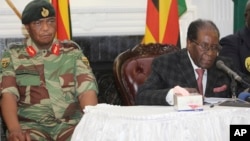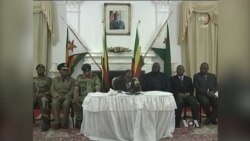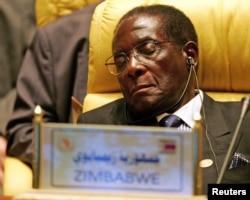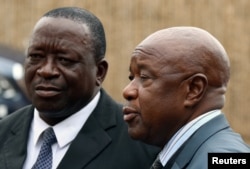When Zimbabwe’s military sent tanks into the capital, Harare, and took President Robert Mugabe into custody nearly a week ago, it was clear they wanted a quick resolution to the growing discontent with the longtime president.
But now, with Mugabe refusing to resign despite repeated attempts at persuasion, and with parliament threatening to begin impeachment proceedings Tuesday, the military could be on a long and complicated path with a formidable opponent: Mugabe himself.
WATCH: President Mugabe's Address
Lovemore Madhuku teaches law at the University of Zimbabwe. He says impeachment can be lengthy, complex and deliberate, because it’s meant to be more than just lawmakers voting out an unpopular leader by a two-thirds vote.
“When we say an impeachment in the Zimbabwean context, it actually means a trial,” he told VOA, noting that the president is allowed to present arguments in his defense at the impeachment hearing.
“You are accusing the president of something and then you want them tried for that. If you find them guilty of that thing that you have accused them of, you then dismiss them from being president...You can’t do it in one day, or in a few minutes or whatever. It takes several months to complete an impeachment.”
Grounds for impeachment
Zimbabwe’s constitution provides four grounds for impeaching a president or vice president: serious misconduct; failure to obey, uphold or defend the constitution; willful violation of the constitution; or inability to perform the functions of the office because of physical or mental incapacity.
Madhuku said that while a lawyer might see several opportunities there — Mugabe is, after all, widely accused of human rights abuses and clamping down on civil liberties during his 37-year rule, and he is 93 years old and sometimes falls asleep at public appearances — politicians may take other factors into account.
For example, he says, it’s unlikely that the ruling ZANU-PF would risk hurting its stature by highlighting actions that elevated the party to prominence, such as Gukurahundi, the series of army-led massacres of political and ethnic rivals in the 1980s.
“If they get him on that, then they are exposing him to that whole issue about, you know, crimes against humanity and so forth,” he said. “And I don’t think that ZANU-PF as currently constituted would want that end to President Mugabe. They are themselves beneficiaries of his leadership... The kind of things they will be accusing him of were things that were done [in the interests of] many of those people that now stand out and want to accuse him, or those that will vote and constitute the two-thirds that say Mugabe must go.”
But these considerations clash with the increasingly loud demands of many Zimbabweans. In recent days, tens of thousands of Harare residents marched to demand Mugabe’s immediate resignation.
More protests expected
On Monday, Chris Mutsvangwa, head of the influential war veterans’ association, said demonstrations would continue — and that the group would also go to court to seek to legalize the military’s actions against Mugabe last week.
“Now we want even more support,” he told supporters in Harare. “It will be a sit-in until Mugabe’s back is seen by the people of Zimbabwe. We are not going to be leaving Harare until he is gone.”
But Madhuku says the military may have underestimated Mugabe and his familiarity with the law.
"So many things they are not aware of in terms of the law,” he said. “I’m sure that’s why they obviously lost the boardroom discussion, because on the legal side, Mugabe is always on the stronger side.”








